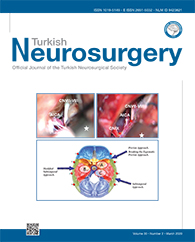2Loma Linda University School of Medicine, Department of Physiology and Pharmacology, Loma Linda, California, USA
3Uludag University, School of Medicine, Department of Neurosurgery, Bursa, Turkey DOI : 10.5137/1019-5149.JTN.27714-19.1 AIM: To evaluate the effect of FSLLRY-NH2, a protease-activated receptor 2 (PAR2) inhibitor, on neurocognitive impairment and hippocampal neuronal degeneration in the setting of asphyxial cardiac arrest (ACA)-induced global cerebral ischemia (GCI) in rats.
MATERIAL and METHODS: A total of 43 Sprague-Dawley male rats were used. Shams and rats resuscitated from 9 minutes of ACA were randomized to two separate experiments including time course and short-term neurological outcomes. FSLLRY-NH2 (50 microgram [μg] per rat) was administered intranasally at 1 hour postresuscitation. Neurological function and hippocampal neuronal degeneration were evaluated after ACA.
RESULTS: Significant neurological function decline and hippocampal neuron degeneration were observed in ACA animals as compared with the shams. Treatment with FSLLRY-NH2 significantly improved neurological outcome and reduced the number of degenerating hippocampal neurons after ACA.
CONCLUSION: Targeting PAR2 may be a novel therapeutic approach in the management of neurological dysfunction after cardiac arrest-associated ischemic injury.
Keywords : Cardiac arrest, cognitive, global cerebral ischemia, PAR2




